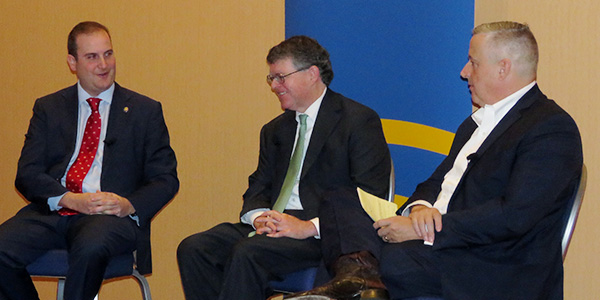By Michael Brooks
FERC Commissioner Bernard McNamee on Monday informed Senate Democrats that ethics advisers told him he was not required to recuse himself from the commission’s ongoing inquiry into RTO/ISO grid resilience (AD18-7).
In a letter to Sen. Catherine Cortez Masto (D-Nev.) dated Jan. 7, McNamee attached a Jan. 2 memo to him written by Charles Beamon, FERC associate general counsel. In the memo, Beamon described his Dec. 12 meeting with McNamee, saying he advised the commissioner that he did “not view your prior position and statements as demonstrative of an unalterably closed mind as to” the proceeding.
Beamon, however, cautioned that “we must exercise continued oversight to ensure that Docket No. AD18-7 does not develop in such a way as to replicate or closely resemble” the Energy Department’s Notice of Proposed Rulemaking for FERC to order RTOs and ISOs to compensate the full operating costs of generators with 90 days of on-site fuel (RM18-1).
McNamee helped draft the NOPR, unanimously rejected by FERC, as the department’s deputy general counsel for energy policy. In response to Democrats at his Senate Energy and Natural Resources Committee confirmation hearing in November, McNamee said he “clearly” would have to recuse himself from the NOPR docket, which Beamon reiterated in his memo. (See Democrats Urge McNamee’s Recusal from Resilience Docket.)
But Beamon said that although the dockets are related, “I advised you that I do not view the relationship as requiring your recusal.” He said he also emphasized the dockets were different proceedings and noted that the resilience docket “is an administrative inquiry in which the commission received over 200 comments suggesting various outcomes.”
After he was confirmed 50-49 in early December, 17 Senate Democrats wrote to McNamee on Dec. 12 — coincidentally the same day he met with Beamon — requesting he update them on what guidance he received. Along with his work on the NOPR, they also questioned his impartiality based on a leaked video of a speech he gave while working for the Texas Public Policy Forum in June. (See Senate Confirms McNamee to FERC.)
In the speech, McNamee criticized environmental groups and renewable energy resources, describing the efforts of his group to change public opinion on fossil fuels as a “constant battle between liberty and tyranny.”
Beamon’s memo quoted case law saying that parties cannot challenge the presumption of an agency official’s impartiality “by merely showing that an official has ‘taken a public position, or has expressed strong views, or holds an underlying philosophy with respect to an issue in dispute.’”
As an example, Beamon cited former Commissioner Philip Moeller’s comments in 2011 on a bill in New Jersey, which he said would “crater the capacity market” in PJM. The Maryland Public Service Commission had cited these comments in its request for rehearing of FERC’s acceptance of the RTO’s revisions to its minimum offer price rule (MOPR) (ER11-2875).
The court unanimously decided that Moeller’s comments “did not show that he ‘had made up his mind regarding two as-yet-to-be filed proceedings concerning a related, but very separate matter — the specific, regionwide operation of PJM’s MOPR,’” Beamon said.
Beamon concluded his memo by saying he “advised you to seek my guidance on any matter related to your past statements, positions, work or any other concerns that you may have.”





